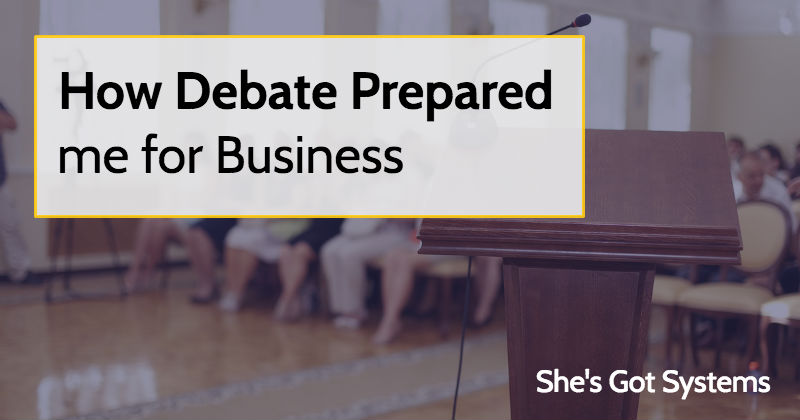I might have a business management and communication degree, but it was surprisingly light on actually running a business. Most of my studies were around mass communication, management styles, and the history of advertising.
But something from my college career did prepare me for business, and that was my career as a debate student. In three years of collegiate debate we covered issues like the death penalty, international treaties, genetically modified foods, and global warming.
In fact, the structure of a debate round parallels that of marketing.
When you’re selling you always start with the status quo; if there’s nothing wrong with your current life or business then nothing needs to change! You have to paint the picture. What needs to change? Present that in a simple and clear plan.
In debate, the plan would be something such as “The US federal government should ratify this treaty” and your plan needs to be similarly clear.
If you’re going to win a debate, it’ll rely on evidence and you want to show a) what advantages there are to acting and b) the disadvantages of not acting.
And of course, you have to show that the plan you propose is going to lead to those results. Let’s say you’re a health coach and your client wants to compete in a marathon. You’ve got to show that without coaching, most people won’t follow through on a marathon OR will run with injuries (these are the disadvantages). Then show that with coaching, your client will be able to successfully run that marathon within three months (achieving the advantage).
In a debate round, it’s the job of the opposing team to negate everything the other team says. In business, those negative claims are often just thoughts and beliefs – either way, you’ll need to address them with FAQs.
Remember that your leads have other options available, including doing nothing or doing it alone. Be sure that you’re answering objections along the way, in an honest and authentic way.
In a debate, it’s all about competing ideals and the decision is up to a judge (or three!) in the back of the room. When you’re selling to leads, it’s more personal and you typically don’t play both sides like you might in a debate tournament.
Other things I learned
You’ll also want to include timelines in everything you do, showing immediate benefits as well as long term results. It’s worthwhile to put investments into perspective and context to help someone make a decision.
Everyone has some part of the debate that they need to focus on improving, so consider what part of your sales process needs some improvement. Share in the comments what part of your sales (debate) process you should focus on more.

 Don’t Cut Down the Tree
Don’t Cut Down the Tree Do you love your business?
Do you love your business? How to Reach Your Business Goals
How to Reach Your Business Goals